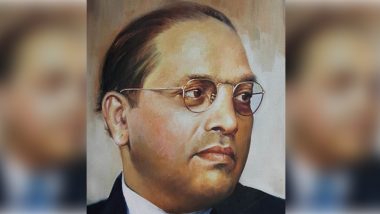London, March 13: The UK government has accepted India's appeal against the closure of Ambedkar House in north London and said the memorial to the architect of the Indian Constitution will remain open to visitors.
UK Communities Secretary Robert Jenrick confirmed that he had granted retrospective planning permission on Thursday for 10 King Henry's Road in Camden, where Dr Babasaheb Ambedkar lived in 1921-22 during his student days at London School of Economics (LSE), to function as a museum.
“I was pleased to grant planning permission for a museum in London to Dr Ambedkar – one of the founding fathers of modern India and an important figure to many British Indians,” said Jenrick.
The minister had “recovered” the appeal in the case last September after the memorial faced closure due to an alleged breach of planning norms for the residential area.
The UK Ministry of Housing, Communities and Local Government stepping in meant that the government was to decide the case based on recommendations from an independent Inspector appointed by the UK's Planning Inspectorate. The Inspector oversaw an inquiry into the Indian government's appeal in the case last year.
“Mr Jenrick decided the government should make the final decision on the appeal, citing the importance of the site and the lasting contribution of the British Indian community on the shared cultural heritage of the country,” the ministry said.
Camden Council, which had opposed the application, said it accepted the decision based on additional evidence provided by the Indian authorities and did not have plans to further appeal.
"Whilst we are disappointed that the Planning Inspectorate has ruled against the council's original decision for 10 King Henry's Road, we do accept and respect the decision that has been made given the additional evidence presented by the appellant at the Inquiry regarding Dr Ambedkar who was a major figure in Indian and British History and his association with this property,” a Camden Council spokesperson said.
The home was bought by the Maharashtra government for around 3.1 million pound and refurbished to transform into a memorial-cum-museum, which now houses photographs and belongings of Ambedkar, with the walls adorned with his famous quotations.
It had been an important stop on Narendra Modi's first visit to the UK as Prime Minister in November 2015 but it ran into trouble after it emerged that the right clearances for the creation of a museum on the site had not been sought. The Indian High Commission in London re-filed an appropriate planning application, which was rejected last year.
During an appeal hearing in September 2019, the Indian side argued that the home holds special significance for a huge section of Indians in the UK and outside because it was where Babasaheb lived during a crucial formative period in his academic life.
“This will have widespread implications for India-UK relations, especially under the current political scenario when we are Brexiting and need to further strengthen our bilateral relations with India,” said Alex Sunshine, who presented himself as a witness on behalf of the Indian government as someone who works with the Dalit community in Maharashtra.
The council, on the other hand, presented expert witnesses to try and establish that the Dalit rights activist's association with the particular London house was very brief and any memorial can be moved elsewhere in order to not deprive the local area of crucial residential and housing space.
“It is just not the right place for it. The association with Dr Ambedkar is tangential at best,” said Nick Baxter, Senior Heritage and Conservation Officer for Camden Council. However, with the appeal being allowed this week, the requisite permission has been granted to ensure the memorial will remain at its current site.
(The above story is verified and authored by Press Trust of India (PTI) staff. PTI, India’s premier news agency, employs more than 400 journalists and 500 stringers to cover almost every district and small town in India.. The views appearing in the above post do not reflect the opinions of LatestLY)













 Quickly
Quickly


